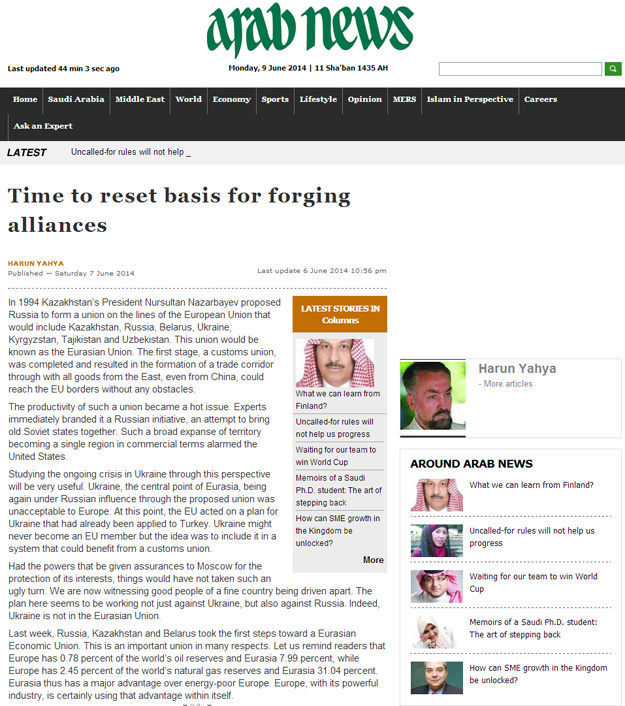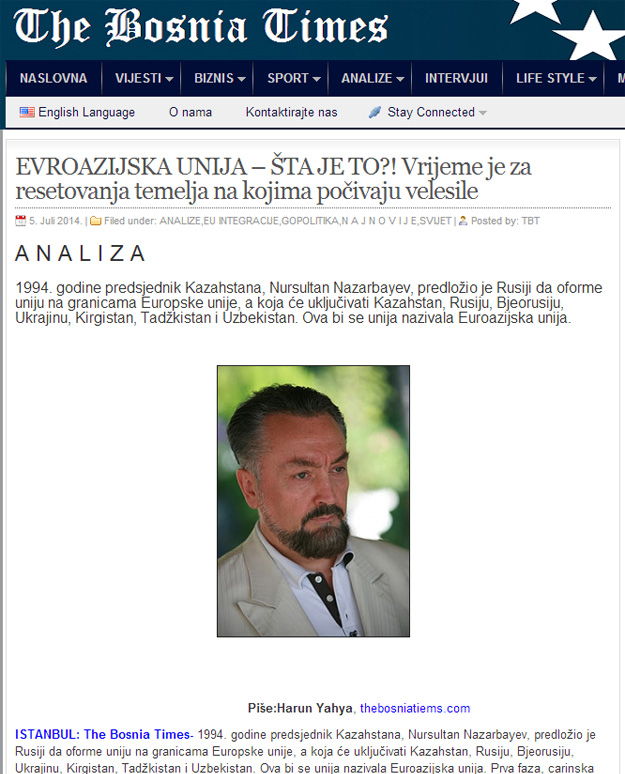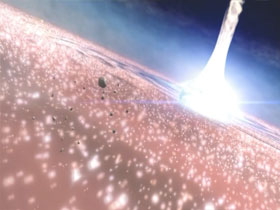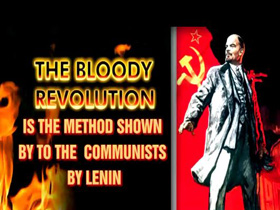Bigotry: The Dark Danger
Time to reset basis for forging alliances

In 1994 Kazakhstan’s President Nursultan Nazarbayev proposed Russia to form a union on the lines of the European Union that would include Kazakhstan, Russia, Belarus, Ukraine, Kyrgyzstan, Tajikistan and Uzbekistan. This union would be known as the Eurasian Union. The first stage, a customs union, was completed and resulted in the formation of a trade corridor through with all goods from the East, even from China, could reach the EU borders without any obstacles.
The productivity of such a union became a hot issue. Experts immediately branded it a Russian initiative, an attempt to bring old Soviet states together. Such a broad expanse of territory becoming a single region in commercial terms alarmed the United States.
Studying the ongoing crisis in Ukraine through this perspective will be very useful. Ukraine, the central point of Eurasia, being again under Russian influence through the proposed union was unacceptable to Europe. At this point, the EU acted on a plan for Ukraine that had already been applied to Turkey. Ukraine might never become an EU member but the idea was to include it in a system that could benefit from a customs union.
Had the powers that be given assurances to Moscow for the protection of its interests, things would have not taken such an ugly turn. We are now witnessing good people of a fine country being driven apart. The plan here seems to be working not just against Ukraine, but also against Russia. Indeed, Ukraine is not in the Eurasian Union.
Last week, Russia, Kazakhstan and Belarus took the first steps toward a Eurasian Economic Union. This is an important union in many respects. Let us remind readers that Europe has 0.78 percent of the world’s oil reserves and Eurasia 7.99 percent, while Europe has 2.45 percent of the world’s natural gas reserves and Eurasia 31.04 percent. Eurasia thus has a major advantage over energy-poor Europe. Europe, with its powerful industry, is certainly using that advantage within itself.
However, it is no secret that Europe is facing certain problems within its borders. With the recent European Parliamentary elections in particular, a shadow has fallen over the union built by Europe in terms of the economy, industrialization and common borders. The victory of right-wing parties — opposed to migration, the EU itself and with somewhat racist tendencies — and a low voters’ turnout has raised legitimate questions about the uncertain future of the union.
Truly, a valuable union meaning that countries can live and grow and become stronger together has fallen under the sway of parties in which ethnocentric national ego prevails. The US should quite frankly be more concerned over this structural change in the EU than over Russian advances. Certainly, the EU Parliament does not represent all of Europe but it is nonetheless true that it represents the general sentiments within the EU. Looking at this step toward a Eurasian Union from all these perspectives:
• EU expansion to the east and north by taking in former Soviet states has been prevented by Russia.
• The 25-year US objective of globalization has been met by a regional union brought about by the Eurasian Union.
• Middle East, Caspian and Central Asian energy corridors will facilitate further economic dynamism for Asia.
• Countries trading in their own national currencies may well weaken the power of the dollar as the premiere international currency.
When we set aside commercial, sociological and geographic differences and look to human and moral values instead, the need again arises for the idea of a “union” to be based on love and solidarity alone. If countries desire globalization and strive to expand their trade frontiers, then before trade partnerships and self-interest they must first strengthen the alliance of love and solidarity between themselves. This is important, even vital, for both the EU and for the newly founded Eurasian Union.
Oppressive systems such as material interests, feelings of ethnic or national ego and the noxious idea of eliminating “weak countries” have no place in unions of love. Nobody who falls down gets kicked in the ribs in a union built on love and there is certainly no idea of “you are not one of us.” Unions built on love grow strong, not by competition between members but by alliance. A union in which love is forgotten will disappear once its common interests fade away.
Let us recall a fact that we have seen demonstrated since the Ukraine crisis again. Europe and the US must not regard Russia as a rival to be beaten; they must strive to gain a friend with whom they can be allies and grow stronger together. It is essential to that end for Europe to abandon the idea of partnership based entirely on self-interest. The idea of self-interest is about to tear the EU apart, a union that is genuinely valuable and in which important services can be performed. This fine union could become a union of peace that instills the spirit of democracy, quality, modernity, beauty, art and unity across the world by strengthening its own internal bonds. To do that it must abandon the machinations of realpolitik and build a system built on what truly makes us human; love.
If this happens, and if the Eurasian Union about to be established in the East also adopts the same principle of love, that will bring about a globalization that is truly desirable, an East-West alliance in which the parties are bonded together. Russia will not be left an isolated country in the East; Europe and the US will stop regarding it as a threat. A world in which all the borders are thrown open, in which the East-West volume of trade is as great as can be, in which people of all countries can move freely to wherever they wish without hindrance, is a world which people long for. The field must not be left to the selfish activities of those who regard their own race, belief and nation as somehow inherently superior. The universe was built on love. Our responsibility is to put love before trade routes and commercial interests.
Adnan Oktar's piece on Arab News & The Bosnia Times:






